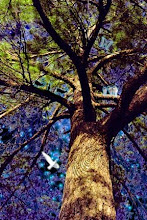
SAN FRANCISCO - It started as a summer project in 2004. Now there are hundreds of them: laminated cards, each with a Cherokee word and picture. Adanhdo: ''heart,'' nvnohi: ''path,'' atseluhisdi: ''saxophone.'' They travel with bicycle messengers all over the world, a mobile international exhibition that Cherokee/Swedish artist America Meredith calls ''Cherokee Spokespeople.''
Meredith, an enrolled member of the Cherokee Nation, began the project because she wanted to do something that was both educational and ''uniquely Cherokee.''
''The most tribally specific art that we have is definitely our syllabary,'' she said.
The Cherokee sylabary was created by Sequoyah in the late 18th century.
''According to Cherokee Nation tribal leadership, our current generation, the fourteenth since European contact with the Cherokees, is said to be the generation that decides whether the language grows or dies,'' Meredith wrote on the Web site www.ahalenia.com.
Meredith, 35, worked as a bicycle messenger for 10 years. She gives away her illustrated cards to members of the close-knit international bicycle messenger community who send her back a photo or video of the card in the spokes of their bicycle in their city. In this way, Cherokee words have spread to Tokyo, London, Zurich, Tapei, Aukland and other cities.
Originally from Oklahoma but now living in San Francisco, Meredith is not a fluent Cherokee speaker herself, but relies on her friends and acquaintances who are fluent. Some of the words on the cards are traditional Cherokee words. Others are created by Cherokee speakers for modern ideas or objects. That's how nuhlisdi gynisdisgi (microwave) and galuyidohi (chopper) came to be a part of her international exhibit.
Though she was a good artist from childhood, Meredith said she was never a good student. In high school, she had a 1.0 grade point average. At the Institute for American Indian Arts, that shot up to a 4.0.
''Oh, I thought, maybe I can make this artist thing work,'' she laughed.
Meredith laughed a lot when she talked, reflecting the wry humor infusing much of her artwork, which ranges from the spokecards to paintings which portray specific moments in American Indian history, sometimes mixing Disney cartoon images with real people.
Choosing specific historical incidents in her paintings, she believes, helps combat the spread of gross generalizations about Native cultures.
In ''Heavens to Murgatroid! Charles Curtis,'' for example, a cartoon Pink Panther stands next to Charles Curtis, the controversial vice president under Herbert Hoover of Kaw, Osage and Potawatomi descent who authored the Curtis Act, which disbanded the governments of the Five Civilized Tribes and broke their land into individual allotments.
In other work, she focuses on incidents of collaboration between Indians and whites, like the Choctaw aid to the Irish people during the 1840s potato famine or the assistance of the longshoreman's union during the occupation of Alcatraz by Indian activists in 1969.
In 2006, she shared an award for Best Painter of San Francisco with Mitsy Avila Ovalles, given by the San Francisco Weekly.
Currently, she is working on using found street signs in a series of portraits of Native bicycle messengers, as well as giving talks on Cherokee artwork.
In all of her work, she balances traditional knowledge and history with the realities of postmodern culture.
The most intimidating talk she had to give was to a group from the United Keetoowah people and the Cherokee Nation, she said. The other two people at the panel discussion didn't show up, and she hadn't brought any slides.
She ended up handing out spokecards and having a conversation.
''Presenting my artwork back to very traditional people in my tribe, it's like very intimidating; do I pass or fail? But they liked the project. I was really happy.''
She recently helped create the Web site for Intertribal Wordpath, an organization that works to preserve Native languages in Oklahoma.
The Cheyenne in that state have 400 fluent speakers left; the Comanche, 100; the Osage, one.
''We are fortunate that we still have a lot of Native speakers,'' Meredith said of the Cherokee, who have about 10,000 speakers in the United States.
She hopes her ''Cherokee Spokespeople'' will help make this generation the one in which the language grows stronger.
''It's all about connection,'' she said.





No comments:
Post a Comment